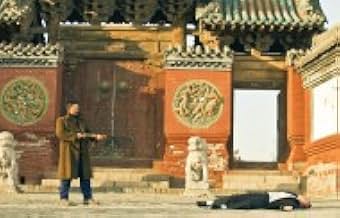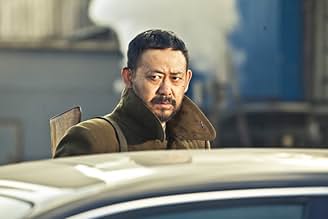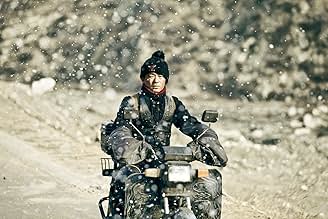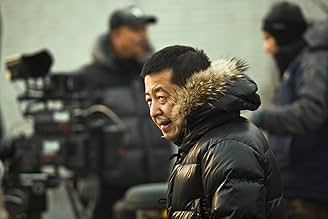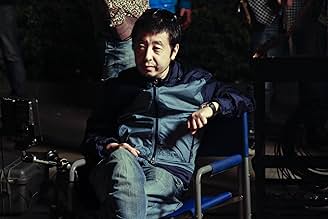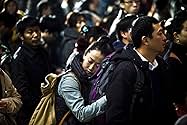Four independent stories set in modern China about random acts of violence.Four independent stories set in modern China about random acts of violence.Four independent stories set in modern China about random acts of violence.
- Awards
- 18 wins & 12 nominations total
Featured reviews
This is a Chinese film written and directed by Jia Zhangke. There are four stories about four characters in modern China. They each face the corrupted modern world with violence. Jia based each story on a real event ripped from the headlines.
The most compelling one has to be Dahai. It's the performance of Wu Jiang. There is a real power in his presence. I would prefer the whole movie staying with him. It's not as simple as rooting for him. Quite frankly, it's hard to root for the guy after he shoots a kid. It reminds me of Michael Douglas in Falling Down. I had a hard time staying with the other stories. I kept waiting to reconnect with the Dahai story. I appreciate the idea of an anthology film. It's often the case that one stands out among the crowd. I always pine for more from one over the others.
The most compelling one has to be Dahai. It's the performance of Wu Jiang. There is a real power in his presence. I would prefer the whole movie staying with him. It's not as simple as rooting for him. Quite frankly, it's hard to root for the guy after he shoots a kid. It reminds me of Michael Douglas in Falling Down. I had a hard time staying with the other stories. I kept waiting to reconnect with the Dahai story. I appreciate the idea of an anthology film. It's often the case that one stands out among the crowd. I always pine for more from one over the others.
after finally watching A Touch Of Sin this evening at ACMI with some friends, it's left me stuck in 2 worlds - missing Jia Zhang-Ke's meditative & lyrical work of the past & liking the new approach to these social wrongs in a more brutal / violent / cynical manner...
first thoughts were quite similar to when i watched another master film maker Kim Ki-Duk's "Pieta" which after further digestion, thought & reading became my fave film of 2013 - both films show violence in a heavy way but still portray it in a meditative & profound manner, using symbolic moments to remind the audience about these issues...
in hindsight i really like this film and where Jia is going with his approach... considering this is a narrative driven film over his powerful and thought provoking documentaries, all the killings were based on real events the director read in blogs... the film is a vessel to show these separate events as one about alienation, the varying classes in china & corruption / political flaws...
here's a good article from Slant which covers a lot of how i feel towards the films - 8/10
http://www.slantmagazine.com/film/review/a-touch-of-sin
first thoughts were quite similar to when i watched another master film maker Kim Ki-Duk's "Pieta" which after further digestion, thought & reading became my fave film of 2013 - both films show violence in a heavy way but still portray it in a meditative & profound manner, using symbolic moments to remind the audience about these issues...
in hindsight i really like this film and where Jia is going with his approach... considering this is a narrative driven film over his powerful and thought provoking documentaries, all the killings were based on real events the director read in blogs... the film is a vessel to show these separate events as one about alienation, the varying classes in china & corruption / political flaws...
here's a good article from Slant which covers a lot of how i feel towards the films - 8/10
http://www.slantmagazine.com/film/review/a-touch-of-sin
One additional star for the topic that few has tried to film.
In about ten or twenty years, these 120 minutes of social depicting will be one of the very rare and precious visual stories for people to understand and entertain what is going on in the first ten years of the 21st century China. It offers a prospective with some interesting details that makes sense to the westerners or maybe its fellow countrymen in the future. But it doesn't really add up for the people living in China nowadays, or at least, the details are not enough.
Stories are too short that they can barely touch the real psychology that the Chinese laborers are having today. I'm not sure whether it is something that the director fails to do or he is not allowed to do. For example, there are lots of complexities existing between a complaining Shanxi miner and a mad murderer. Throughout the first story, the only real attempt Dahai, who has learned the laws and has close relatives living in the city, has made to disclose the corruption is a mail letter without a specific address. This is far away from the countless efforts that a Chinese miner would make before he explode himself with the illegal riches. To me, the efforts, the struggles, and the final desperate in Dahai's mind are the most interesting parts of the story. However, nothing really happens in the movie. The result is that, Dahai seems more like a legendary cowboy coming from a classic American western movie than a struggling Chinese worker who has relatives to care about.
It touches the social issues we are all witnessing in China today, it is entertaining and somewhat heroic, but it fails to restore the story into reality, let alone into a provoking level.
In about ten or twenty years, these 120 minutes of social depicting will be one of the very rare and precious visual stories for people to understand and entertain what is going on in the first ten years of the 21st century China. It offers a prospective with some interesting details that makes sense to the westerners or maybe its fellow countrymen in the future. But it doesn't really add up for the people living in China nowadays, or at least, the details are not enough.
Stories are too short that they can barely touch the real psychology that the Chinese laborers are having today. I'm not sure whether it is something that the director fails to do or he is not allowed to do. For example, there are lots of complexities existing between a complaining Shanxi miner and a mad murderer. Throughout the first story, the only real attempt Dahai, who has learned the laws and has close relatives living in the city, has made to disclose the corruption is a mail letter without a specific address. This is far away from the countless efforts that a Chinese miner would make before he explode himself with the illegal riches. To me, the efforts, the struggles, and the final desperate in Dahai's mind are the most interesting parts of the story. However, nothing really happens in the movie. The result is that, Dahai seems more like a legendary cowboy coming from a classic American western movie than a struggling Chinese worker who has relatives to care about.
It touches the social issues we are all witnessing in China today, it is entertaining and somewhat heroic, but it fails to restore the story into reality, let alone into a provoking level.
The director has so much to express, which makes the film loose. He wants to show the whole picture of modern China by referencing lots of news in the stories. But it weakens the story itself. The fourth fragment is most representative. It seems not so reasonable.
A few actors are great, like Wu and Tao, while others do not their roles. Baoqiang is not ferocious enough as a professional robber. Some guest actors are unnecessary, even ruin this movie, such as Sanming.
Anyway, we should show respects to both Zhangke and this movie. He really wants to express his anxiety about this sick society. He reminds us this situation is unstable and unsustainable. We are on the edge of a crash.
A few actors are great, like Wu and Tao, while others do not their roles. Baoqiang is not ferocious enough as a professional robber. Some guest actors are unnecessary, even ruin this movie, such as Sanming.
Anyway, we should show respects to both Zhangke and this movie. He really wants to express his anxiety about this sick society. He reminds us this situation is unstable and unsustainable. We are on the edge of a crash.
The first minute of this film is better than entire acclaimed English-speaking movies of the year I'm watching it; 2020. But the film is ultimately disappointing.
Every movie director can take nice pictures, but this is a film of not only stunning visuals but stunning visuals time and again imbued with meaning in relation to society and environment.
The film is actually several separate short stories. Short stories can be perfect ideas uncorrupted by the extrapolation necessary for full-length films. But these short films reveal the weakness in lack of depth usually associated with the short film form: the limited time in which, with depth, to tell a tale.
Each of the main characters are victims of their situation, exploited by others in positions of authority in a society built this way. The users are not seen as such by the general mass of the people, who the director shows as dumb animals, most clearly in a scene with a mistreated animal in relation to the scene that it follows.
Though the short films are fleshed-out snapshots, they are snapshots all the same, wasting the promise of meaning imbued in single images. But the great failing is the lack of resolution to each story. A fatuous comeuppance is stuck on almost all as the director takes the easy way out.
These dim-witted "resolutions" are as if these days to end a film this way is more than acceptable, it is acclaimed. It is too easy to simply give up and do a Tarantino. The stories haven't quite lived up to their potential and then are given up on.
Still, despite its flaws, what is good about the film shows a great filmmaker at work.
Every movie director can take nice pictures, but this is a film of not only stunning visuals but stunning visuals time and again imbued with meaning in relation to society and environment.
The film is actually several separate short stories. Short stories can be perfect ideas uncorrupted by the extrapolation necessary for full-length films. But these short films reveal the weakness in lack of depth usually associated with the short film form: the limited time in which, with depth, to tell a tale.
Each of the main characters are victims of their situation, exploited by others in positions of authority in a society built this way. The users are not seen as such by the general mass of the people, who the director shows as dumb animals, most clearly in a scene with a mistreated animal in relation to the scene that it follows.
Though the short films are fleshed-out snapshots, they are snapshots all the same, wasting the promise of meaning imbued in single images. But the great failing is the lack of resolution to each story. A fatuous comeuppance is stuck on almost all as the director takes the easy way out.
These dim-witted "resolutions" are as if these days to end a film this way is more than acceptable, it is acclaimed. It is too easy to simply give up and do a Tarantino. The stories haven't quite lived up to their potential and then are given up on.
Still, despite its flaws, what is good about the film shows a great filmmaker at work.
Did you know
- TriviaJia Zhang-ke: in the third story as a patron of the brothel. He is shown walking down a hallway from behind talking on his cell phone and smoking a cigar. At the end of the shot he turns to survey the line of girls in the hallway.
- ConnectionsFeatured in At the Movies: Episode #10.23 (2013)
- How long is A Touch of Sin?Powered by Alexa
Details
- Release date
- Countries of origin
- Official site
- Languages
- Also known as
- Touch of Sin
- Filming locations
- Chongqing, China(San'er episode)
- Production companies
- See more company credits at IMDbPro
Box office
- Gross US & Canada
- $154,120
- Opening weekend US & Canada
- $19,867
- Oct 6, 2013
- Gross worldwide
- $854,891
- Runtime
- 2h 10m(130 min)
- Color
- Sound mix
- Aspect ratio
- 2.35 : 1
Contribute to this page
Suggest an edit or add missing content


